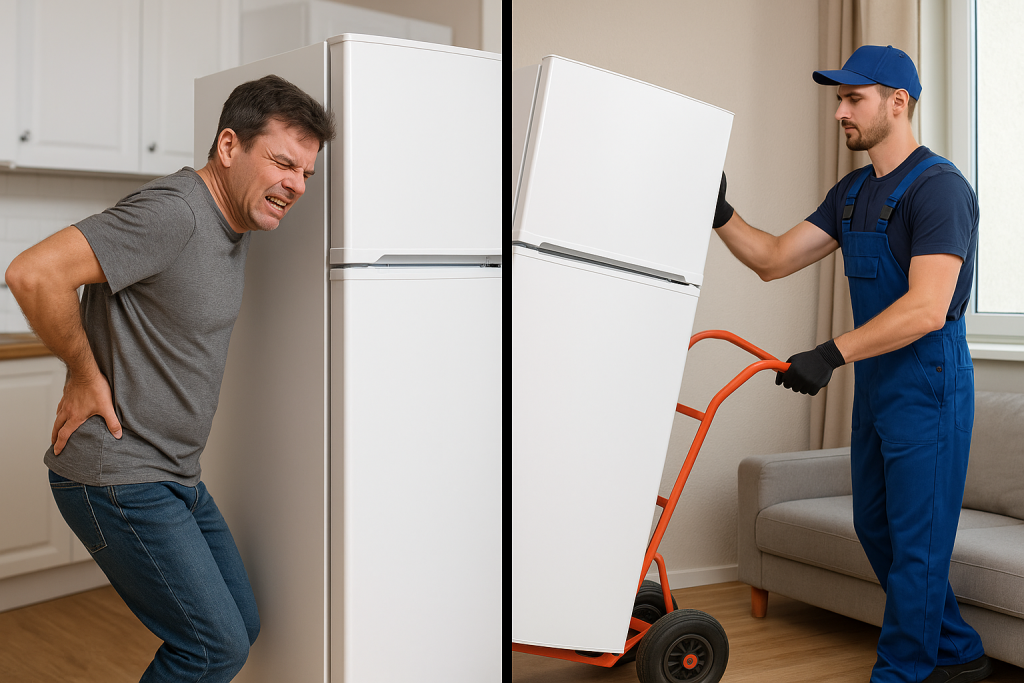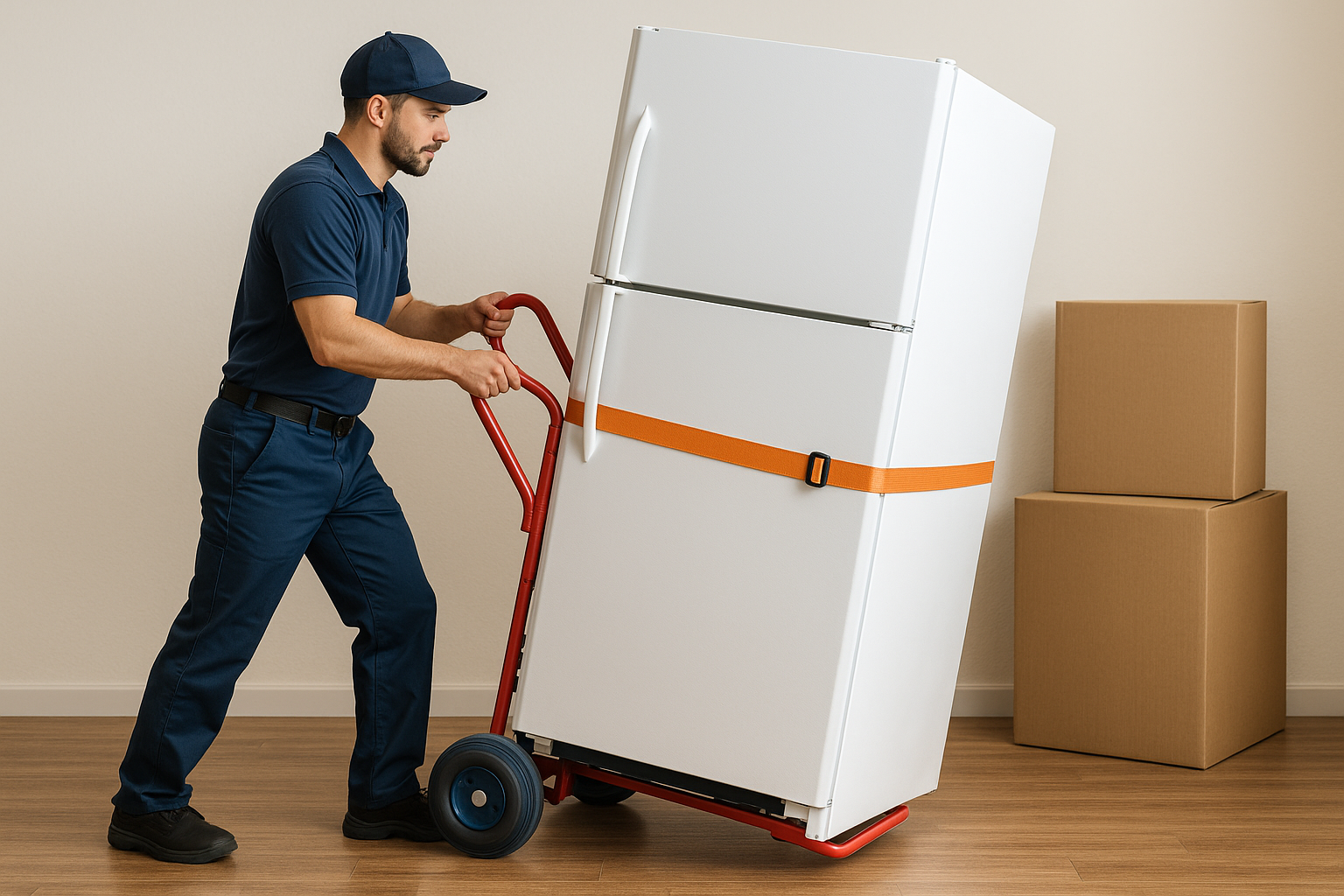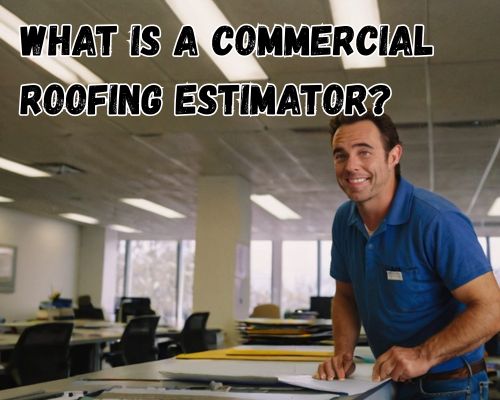When it comes to moving, few tasks are as challenging as relocating large appliances. From fridges and stoves to washers and dryers, these bulky and fragile items require careful handling. Whether you’re moving to a new home or relocating your business, hiring professional appliance movers can ensure your appliances are safely transported, saving you time, money, and stress. Here’s why professional appliance movers are essential for your next relocation.
Expertise and Skill for Safe Appliance Handling
Moving large appliances isn’t as simple as just picking them up and moving them to the next location. These items often require special knowledge and skills to transport them safely. Professional appliance movers are trained to handle such items efficiently, ensuring that your appliances and property are protected from damage.
The Benefits of Professional Expertise:
- Specialized Techniques: Movers know how to lift and carry appliances without damaging the items or their surroundings.
- Safety First: With experience, they can safely navigate tricky corners, stairs, or narrow hallways.
- Efficient Process: Professional movers employ specialized techniques that expedite the move, ensuring it is safer and more efficient.
Protect Your Appliances from Damage

Moving large appliances on your own can result in costly damage. Whether it’s a refrigerator denting or a washer scratching, it can be hard to prevent these damages. Professional appliance movers come equipped with the right tools to minimize the risk of damage to your appliances during the move.
Key Protection Features:
- Proper Equipment: Movers come equipped with moving blankets, straps, and dollies to prevent scratches, dents, and other damage.
- Secure Loading: Your appliances will be carefully loaded into the moving truck to prevent shifting or damage during transport.
- Insurance Options: Many professional appliance movers offer insurance for added peace of mind, in case anything goes wrong during the move.
Prevent Injury to Yourself and Others
Attempting to move large appliances on your own can lead to serious injuries. Lifting heavy appliances without the proper training or equipment can cause back strain, muscle sprains, and even broken bones. Professional movers are trained to lift heavy items safely and correctly, thereby reducing the risk of injury.
How It Protects You:
- No Risk of Injury: Movers handle the lifting, so you don’t have to worry about straining yourself or risking an injury.
- Proper Lifting Techniques: They understand the correct posture and methods for safely carrying heavy items.
- Safer for Everyone: Professional movers also reduce the risk of injury to others involved in the move, such as family members or friends who may be assisting with the move.
Right Tools and Equipment for Safe Transport
Professional appliance movers bring more than just muscle—they come with the necessary tools to handle any situation. From dollies and ramps to straps and padding, these tools are designed to protect both your appliances and your property.
- Specialized Tools: From hand trucks to padded blankets, they have the right equipment for every step of the move.
- Adaptable to Any Situation: Whether you’re dealing with tight spaces or stairs, professional movers know how to use their tools for maximum efficiency.
- Safety-First Approach: The right equipment reduces the risk of dropping, breaking, or damaging your appliances during the move.
Avoid Property Damage
In addition to protecting your appliances, professional movers also safeguard your home or office during the move. Transporting large items through doorways, down stairs, or along narrow hallways can lead to scratches, dents, and other types of property damage. Movers use padding, ramps, and careful planning to prevent these accidents.
Property Protection Features:
- Floor Protection: Movers use floor runners to protect your floors from scratches or damage during the move.
- Wall and Door Protection: Furniture padding helps protect walls and doors from dents and scratches.
- Careful Navigation: They plan their route to avoid any obstacles and ensure that both your appliances and property remain intact.
Cost-Effective in the Long Run
While the upfront cost of hiring professional appliance movers may seem like an added expense, it can actually save you money in the long run. The risk of damaging your appliances, home, or injuring yourself is much greater when you attempt the move on your own. Additionally, professional movers can complete the job more quickly, reducing costs associated with long move times.
Financial Benefits:
- Damage Prevention: By avoiding damage to your appliances and property, you eliminate the need for costly repairs or replacements.
- Insurance Coverage: If something goes wrong, insurance coverage from professional movers can save you money in the event of damage.
- Faster and More Efficient: A quicker move means lower costs for moving services and less downtime for your business or home.
Ideal for Both Residential and Commercial Moves
Professional appliance movers aren’t just for home relocations—they are also essential for commercial moves. Whether you’re moving a large kitchen full of equipment or heavy machinery for a business, professional movers can handle commercial appliance relocations with the same care and attention they give residential moves.
Commercial Moving Benefits:
- Handling Large Equipment: Movers are experienced in handling bulky commercial equipment and appliances.
- Business Continuity: Professionals ensure minimal downtime during your business move, allowing you to resume operations quickly.
- Expert Setup: Movers can often assist with the installation and setup of appliances at your new location, helping to get your business up and running faster.
FAQs About Professional Appliance Movers

1. How much does it cost to hire professional appliance movers?
Costs can range from $200 to $500, depending on factors like the distance of the move, the number of appliances, and the complexity of the relocation.
2. Do appliance movers offer installation services?
Yes, many appliance moving companies offer installation services as part of their package. It’s a good idea to check with the movers beforehand to see what services are included.
3. Can I move large appliances on my own?
While it’s possible, it’s risky. Without the proper equipment and experience, you risk damaging your appliances or injuring yourself. Professional movers are the safer choice.
4. How far in advance should I book professional movers?
It’s recommended to book professional appliance movers at least 1-2 weeks in advance to ensure availability.
5. Are appliance movers insured?
Most appliance moving companies provide insurance for your appliances during the move. Be sure to ask about coverage options when booking your trip.
Hiring professional appliance movers for your relocation ensures the safe and efficient transport of your valuable appliances. Whether moving across town or handling a commercial relocation, these experts provide the tools, expertise, and efficiency necessary to make the process as stress-free as possible. Save yourself time, avoid injuries, and protect your appliances—hire professional movers for your next move.
Buzzmoving matches you with trusted movers nationwide, making your move effortless and worry-free. Request your free quote today and let our experts take care of the rest!



